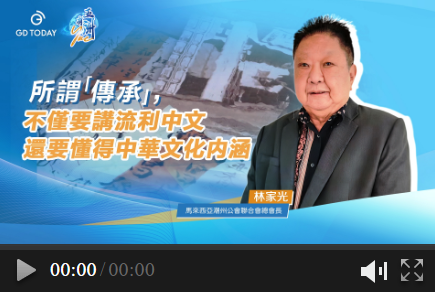After concluding his state visit to China, Malaysia’s Yang di-Pertuan Agong Sultan Ibrahim expressed that the visit was fruitful, further consolidating the friendship and bilateral relations between Malaysia and China. Sultan Ibrahim also said that China’s rise on the international stage over the past 20 years has been astonishing and is a model worth learning from for Malaysia.
Recently, Lim Keh Kuan, president of the Federated Teochew Associations of Malaysia, expressed his deep agreement. As a second-generation Chinese born in Malaysia, he has witnessed the rise of his home country and the deepening cooperation between China and Malaysia. He noted that this year marks the 50th anniversary of the establishment of diplomatic ties between China and Malaysia, and exchanges between the two countries are increasing. Therefore, conducting quality Chinese language education and inheriting Chinese culture carry greater significance in the current era.
Lim Keh Kuan has been influenced by Chinese culture since childhood, attending Chinese schools, practicing Chinese calligraphy, and participating in traditional rituals. When he was young, he once felt inferior for attending a Chinese school until he joined the Teochew Association and found a sense of belonging, realizing the importance of Chinese education.
Over the past five decades, Lim Keh Kuan has risen from an ordinary member of the Teochew Association to the head of the Youth Group, then the president of the Selangor and Kuala Lumpur Teo chew Association, and finally the president of the Federated Teochew Associations of Malaysia (Teochew-Malaysia for short). Teochew-Malaysia was founded in 1934 at the Han Jiang Ancestral Temple in Penang and is the highest leadership organization of Teochew associations in Malaysia and currently has 58 affiliates.
“How can you inherit Chinese culture if you don’t understand the Chinese language?” In an exclusive interview with GDToday, Lim Keh Kuan admitted that Chinese education in Malaysia is facing many crises, such as a lack of teachers, the marginalization of subjects, and a decline in student enrollment. Since becoming the president of Teochew-Malaysia, he has focused on organizing activities related to Chinese culture and education, hoping to promote the inheritance of Chinese culture in Malaysia.
About qiaopi
Overseas Chinese have always supported the development of their hometown
Lim Keh Kuan’s impressions of his hometown begin with qiaopi.
“I used to help my family write qiaopi letters when I was a child, so I am quite familiar with them,” said Lim Keh Kuan as he wrote a qiaopi letter at the opening ceremony of the Qiaopi History and CultureExhibition themed “Three Rivers Flowing into the Sea, One Letter Returns to the Hometown” in Kuala Lumpur, Malaysia, on August 8. A wave of nostalgia surged up in his heart.
Qiaopi, once the letters and remittances sent by overseas Chinese to their families in China, documented the difficult entrepreneurial history and strong patriotism of the older generation of overseas Chinese. Although qiaopi has been out of use for many years, the culture of remittance letters remains everlasting. In 2013, it was added to the “Memory of the World Register” and continues to thrive across borders.
GDToday: How did your family come to Malaysia from Shantou to make a living?
Lim Keh Kuan: My father came to Malaysia when he was six years old, and my mother is also from Chaoshan. I grew up under their influence. We speak the Chaoshan dialect at home, and my mother often tells Chaozhou proverbs, so we still understand many of them today, which some younger Chaoshan people may not understand anymore. For example, my mother says, “bones growing meat is crucial,” meaning that there’s no such thing as a free lunch, and you shouldn’t expect others to earn money for you to spend.
GDToday: Do you have any memories of qiaopi?
Lim Keh Kuan: When I was in middle school, I also helped write qiaopi, so I’m quite familiar with them. There’s a street near us called Petaling Street, where someone would help you write qiaopi for about 20 cents using a formulaic template. After writing, they would hand it over to boatmen who would carry them back to China and the countryside. Many didn’t have addresses, so they would go to China and call out the names, and the recipients would come to collect.
GDToday: What significance and value do you think qiaopi have today?
Lim Keh Kuan: When these Chinese people first came to Malaysia, their salaries were low, about two Malaysian dollars a month. But they never forgot their patriotism and their families in their hometown, saving money to send back. I think qiaopi embody filial piety and indirectly supported China’s development at that time. There’s also a sense of credibility in qiaopi. To my knowledge, qiaopi has never been lost in all this time.
About Chinese education
Inheriting Chinese culture is of great importance
Sixty or seventy years ago, Lim Keh Kuan’s father was hesitant to send him to a Chinese school because English schools were more popular at that time. When Lim Keh Kuan became a father, he firmly sent all three of his children to Chinese schools, believing that receiving Chinese education would bring them another valuable asset.
Having worked in Chinese community organizations for most of his life, Lim Keh Kuan speaks the familiar dialect of his hometown, has made intimate friends, and felt the charm of Chinese culture. He vigorously promotes cultural activities and supports Chinese education, hoping to leave these valuable assets to more Chinese people in Malaysia.
GDToday: What is your original intention in actively promoting the development of Chinese education?
Lim Keh Kuan: I went to Chinese schools since childhood, and I felt like receiving Chinese education made me inferior because it seemed like there was no future in it, as it wasn’t often used in work. But when I joined the Teochew Association, things were different. We could communicate in our dialect and did many meaningful things. But it may not be about making money. It’s about friends you can make and your recognition of the Chinese language without notice. Also, people who receive Chinese education tend to value family more. I believe that community organizations, especially those related to our hometowns, play a vital role in preserving our culture. If you don’t understand the Chinese language, how can you inherit the culture? You can’t even read it.
GDToday: What challenges does Chinese education face in Malaysia today?
Lim Keh Kuan: The most severe problem facing Chinese education in Malaysia is the shortage of teachers. There is a lack of Chinese teachers, and more than 60% of the teachers in middle schools are not ethnic Chinese. To become a Chinese teacher in Malaysia, one must have a university degree with a distinction in Chinese. However, the number of students registering for the Chinese language examination is declining, from over a thousand in the past to only 200 now. Malaysia also sends some students to Beijing to learn Chinese, and they may speak fluent Mandarin, but they don’t understand the spirit and connotations of Chinese culture. I describe them as soulless shells. If the number of Chinese language teachers continues to decline, it will be hard to sustain Chinese language education, let alone preserve our culture.
GDToday: As the head of a Chinese community organization, how do you promote the preservation of traditional culture?
Lim Keh Kuan: After becoming president of the Federated Teochew Associations of Malaysia, I focused more on culture and education and initiated many cultural and educational activities. At the same time, the Teochew-Malaysia has also been actively following the issue of Chinese language faculty in Malaysia and has launched fundraising plans to encourage more people to become Chinese teachers.
About China-Malaysia cooperation
Unlimited business opportunities in the future
On May 31, 1974, China and Malaysia formally established diplomatic relations, making Malaysia the first ASEAN country to establish diplomatic ties with China after the founding of ASEAN. This year marks the 50th anniversary of the establishment of diplomatic relations between China and Malaysia and the Year of China-Malaysia Friendship, with increasing exchanges and cooperation between the two countries.
Last year, Lim Keh Kuan returned to China multiple times. He was impressed by China’s rapid development and looked forward to more cooperation between China and Malaysia.
GDToday: How do you feel when you return to Shantou in recent years?
Lim Keh Kuan: Based on my personal observations, 50 years ago, China was 30 years behind Malaysia. Today, China has advanced 30 years ahead of Malaysia, marking incredible progress. I visited Shantou three times last year, and I felt that the change was enormous. It seemed like Shantou was undergoing reforms and had transformed into a beautifully developed city. This may also be a characteristic of Chaoshan people who live by the sea, with broad minds, hospitality, and an indomitable spirit. My life creed is that if you dare to fight, you have a chance to succeed.
GDToday: Which industries do you think China can better connect with Malaysia in the future?
Lim Keh Kuan: After all, Malaysia is a relatively small country that still requires significant resource support from China, while China’s development also needs cooperation with Malaysia. If Chinese entrepreneurs invest in Malaysia for property development, they will mainly interact with Chinese communities. Currently, the total number of ethnic Chinese in Malaysia is 6.9 million, accounting for 22.4% of the country’s population, and this proportion is constantly decreasing. If Chinese businesses come to Malaysia, they can utilize the country’s rich natural resources such as petroleum, palm oil, rubber, timber, gasoline, etc. Chinese merchants can process these resources into semi-finished or finished products for export, creating vast business opportunities through this collaboration.
GDToday: What are Malaysia’s unique advantages when it comes to cooperation between China and Malaysia?
Lim Keh Kuan: Malaysia currently plays a crucial role in China’s overseas development. One of Malaysia’s strengths is its lack of linguistic barriers. It is easy to communicate here in Mandarin, Cantonese, Teochew dialect, Hokkien, and Hakka, among others. Many Chinese parents now send their children to Malaysia for education, where they can obtain dual degrees, improve their language skills, and potentially become “hai gui” (overseas returnees) in the future. Moreover, Malaysia has always maintained close ties with China throughout their diplomatic relations.


